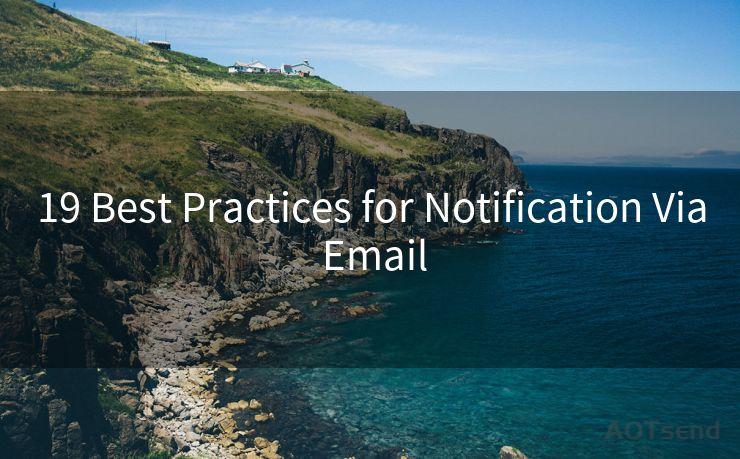19 Best Practices for Notification Via Email




Email notifications are a crucial part of any online service, keeping users informed and engaged. However, sending effective email notifications is an art that requires careful consideration. Here are 19 best practices for notification via email that will help you master this art and optimize your communication with users.
1. Obtain Explicit Permission
Before sending any email notifications, ensure you have the user's explicit permission. This not only complies with anti-spam regulations but also ensures that your messages are welcomed by the recipient.
2. Personalize Your Emails
Use the recipient's name in the subject line and body of the email to create a more personal connection. Personalized emails have higher open and click-through rates.
3. Craft Clear and Concise Subject Lines
The subject line is the first thing a user sees, so make it count. Keep it short, sweet, and to the point, accurately summarizing the email's content.
4. Use a Recognizable Sender Name
Ensure the sender name is familiar and trustworthy to the recipient. Avoid using generic or misleading sender names.
5. Optimize for Mobile Devices
Most emails are now opened on mobile devices. Ensure your emails are mobile-friendly with responsive designs that adapt to different screen sizes.
6. Provide Relevant Content
Every email notification should contain relevant and valuable information for the user. Avoid sending unnecessary or spammy emails.
7. Include a Clear Call to Action
Guide the user to the next step with a prominent call to action button or link. Make it easy for them to take the desired action.
8. Use a Clean and Simple Design
Avoid clutter and distractions in your email design. Stick to a clean, minimal layout that focuses on the message and call to action.
9. Test Email Deliverability
Regularly check if your emails are reaching inboxes or being marked as spam. Use tools like MailTester or SendForensics to test deliverability.
10. Monitor and Analyze Metrics
Track key metrics like open rate, click-through rate, and unsubscribe rate to measure the effectiveness of your email notifications.
11. Segment Your Audience
Tailor your emails to specific user groups based on their interests, behaviors, or preferences. Segmentation improves engagement and conversion rates.
12. Use A/B Testing
Experiment with different subject lines, content, or designs to see what works best for your audience. A/B testing helps you optimize your emails for maximum impact.
13. Respect Unsubscribe Requests
Make it easy for users to unsubscribe if they no longer want to receive emails. Respecting their choices helps maintain a positive brand image.
14. Avoid Over-Emailing
Bombarding users with too many emails can lead to unsubscribes and spam complaints. Strike a balance between keeping users informed and not overwhelming them.
🔔🔔🔔
【AOTsend Email API】:AOTsend is a Managed Email Service for sending transactional emails. Support Email Types: reminders, authentication, confirmations, notifications, verification codes, invoices, password resets, account activations, billing statements, two-factor authentication (2FA), and one-time passwords (OTP) emails, etc. $0.28 per 1000 Emails. 99% Delivery, 98% Inbox Rate.
You might be interested in:
Why did we start the AOTsend project, Brand Story?
What is a Managed Email API, How it Works?
Best 25+ Email Marketing Platforms (Authority,Keywords&Traffic Comparison)
Best 24+ Email Marketing Service (Price, Pros&Cons Comparison)
Email APIs vs SMTP: How they Works, Any Difference?
15. Use Engaging Language
Write in a friendly, conversational tone that encourages users to interact with your emails. Avoid sounding too formal or robotic.
16. Include Social Media Links
Provide links to your social media profiles to encourage users to connect with you on multiple platforms.
17. Follow CAN-SPAM Act Guidelines
Ensure your emails comply with the CAN-SPAM Act, which sets rules for commercial email, establishes requirements for commercial messages, gives recipients the right to have emails stopped from being sent to them, and spells out tough penalties for violations.
18. Use a Reliable Email Service Provider (ESP)
Choose an ESP with a good reputation for deliverability and advanced features like automation, segmentation, and analytics.
19. Continuously Iterate and Improve
Email marketing is an ongoing process of optimization. Regularly review your strategies, test new ideas, and make improvements based on user feedback and analytics data.
By following these 19 best practices for notification via email, you can significantly improve your email marketing efforts and build stronger relationships with your users. Remember, effective email notifications are not just about selling but about providing value and fostering trust with your audience.





Scan the QR code to access on your mobile device.
Copyright notice: This article is published by AotSend. Reproduction requires attribution.
Article Link:https://www.mailwot.com/p3551.html



